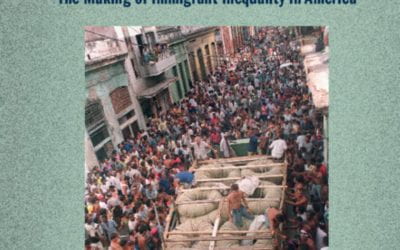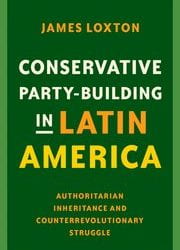Pandemia Far from Home
Coming to Harvard’s David Rockefeller Center for Latin American Studies (DRCLAS) as the Santo Domingo Visiting Scholar has been one of the best experiences of my life. I encountered an absolutely challenging and inspiring environment, where one is always learning and, above all, questioning one’s own thinking and knowledge.
I arrived to Cambridge from Colombia, where I work as an associate professor at the Universidad de los Andes Business School in Bogotá, with my husband and two daughters in what would be the ideal sabbatical year. I dedicated myself to research, while 14-year-old Alicia began her freshman year of high school and 12-year-old Ema attended one of Cambridge’s middle schools; my husband Fernando would begin to explore new career explorations.
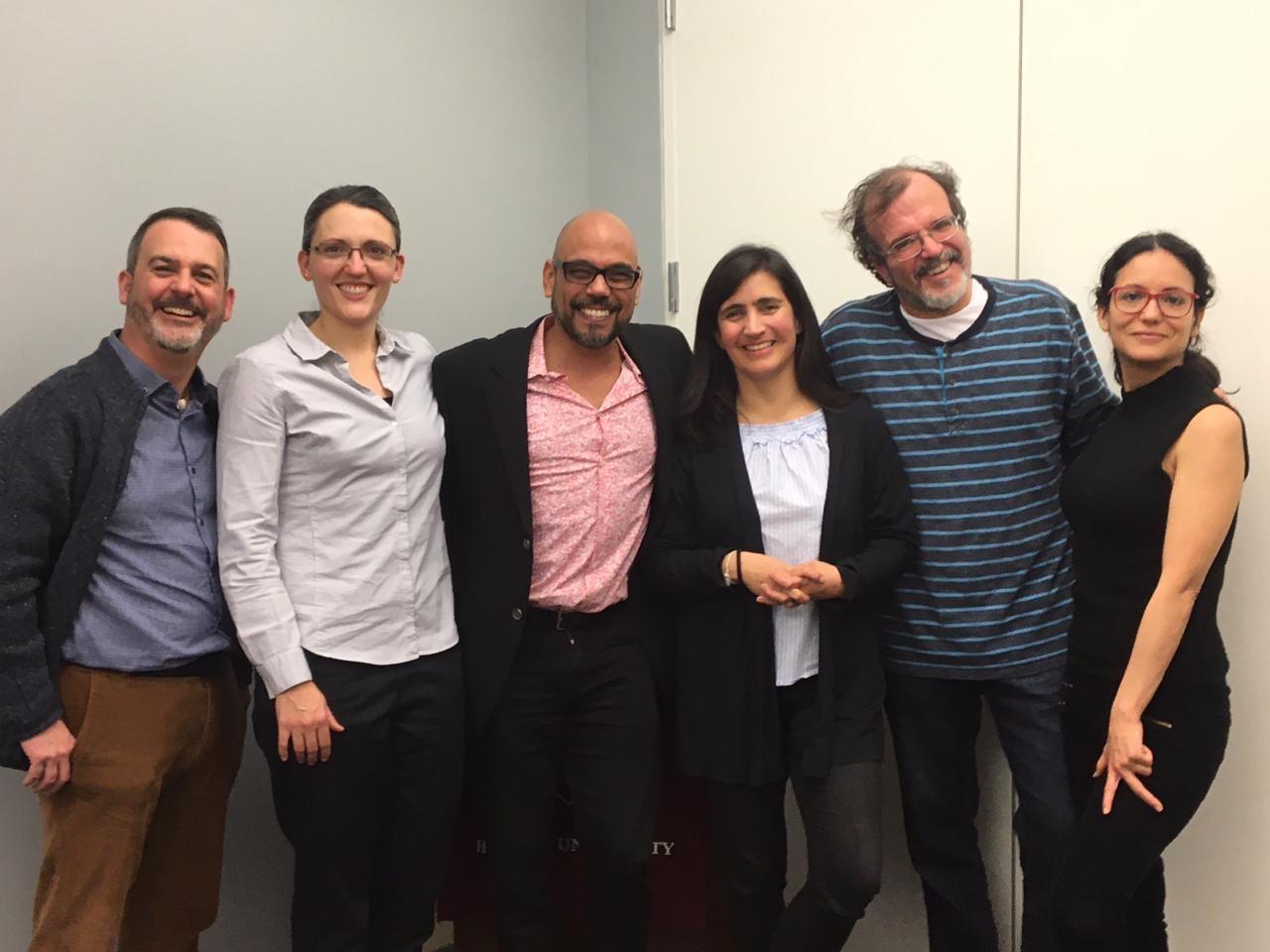
My daughters rapidly adapted to their schools. They made good friends and quickly became almost native-level English speakers. Alicia joined the crew team and trained very strenuously; she had rowing competitions in the fall, training with her fellow crew members all winter to perform as a better team for the 2020 spring competitions. Ema had some spectacular extracurricular activities, including innovation challenges working together with companies like Bose and the innovation center at Children’s Hospital in Boston. She also participated in a girls’ science club and several classes at MIT. To be an adolescent in a city like Cambridge is a privilege: one can choose from an unimaginable selection of activities in sports, classes at Harvard and MIT and challenges of innovation and entrepreneurship. Above all, there is the sense that one can be out on the streets on one’s own at a very young age with a sense of security, autonomy and independence that my daughters don’t have in their daily life in Bogotá.
Fernando, who initially we thought would spend more time traveling to Colombia for projects with his business, managed to coordinate a great part of his work from home and, after receiving work visa, already had projects here. The possibility of being near the family who live on the outskirts of Boston and in the United States was also part of this great adventure.
For me, the days took place between home and office, a space I shared with a marvelous team of colleagues and other DRCLAS Visiting Scholars from whom I learned a lot. Roaming Harvard’s magnificent and enormous campus on a daily basis, having the possibility of going to classes, conferences and seminars, to make contact with other researchers and professors, lecturers, the most interesting people in the most varied fields, to be able to stop by the library to pick up a book or to work in one of its many inspiring rooms, to go to the gym or sports centers, to visit the lakes, the river, to wander through museums just a few blocks from the office, to gaze at the architecture at both Harvard and MIT and to discover daily all sorts of marvelous corners throughout Cambridge. All this on foot or bike, which reflected a more paused rhythm of life, with much work and projects, but without the pressure of pending deadlines and with an atmosphere conducive to creation and writing. This time at Harvard has been a time to learn to enjoy a process more than concrete results. It is to have given myself the time to learn, to unlearn, to break with paradigms and to receive.
In the midst of this context, we began to hear news about a virus that was in China, news that felt very faraway and that we didn’t think would affect our marvelous routine. At the beginning of March, Harvard sent an email to its students, asking them not to leave for spring break, scheduled for the third week of the month, and that for now we would not return to the office. A few days later, the university sent another email to all students, asking them to leave for spring break and not come back. Those were very strange days. Although libraries and museums still were open to those with a Harvard ID, access to the public was prohibited. We had the possibility of being by ourselves, for example, in the Peabody Museum, a true gift, but at the same time with the emptiness of the halls, feeling that something more severe than we had ever imagined was about to happen. Then the libraries began to close and many of the cafés and restaurants.
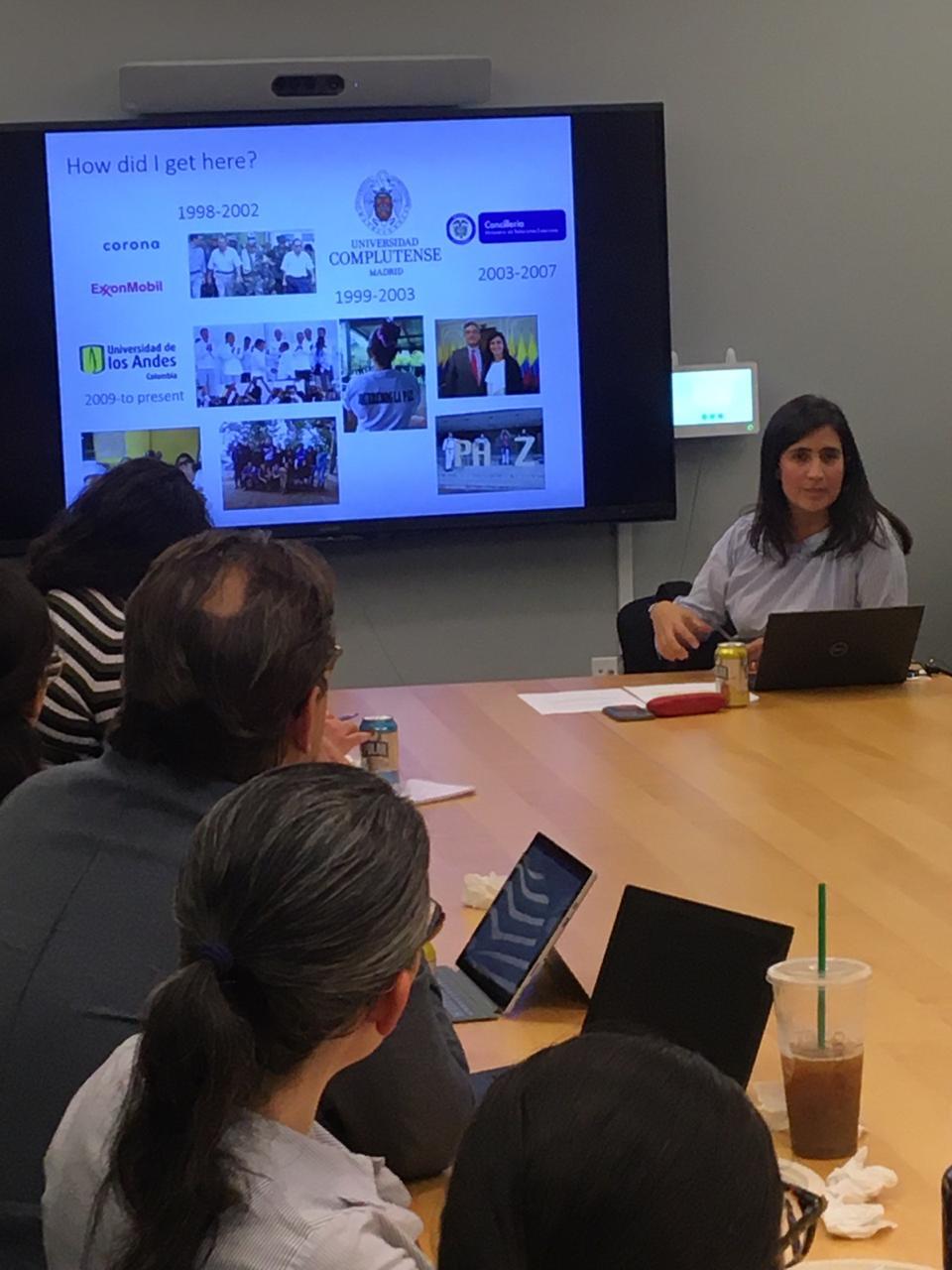
The atmosphere in the university was very strange in those days, celebrations in the midst of happiness and sadness, farewells and fiestas rapidly pushed up. We witnessed hugs and suitcases as bit by bit, the campus began to empty out. At the same time, we were watching on television and reading in the press how in each and every country in Latin America was closing its borders and the airports. And that is when, since the four of us were together already here in Cambridge, we decided to stay and wait out the storm: to travel on an airplane would put us all at risk—although at the moment we had absolutely no inkling of how long the storm would last.
From that moment on, the routine and life changed, obviously not just for us, but for everyone. “Stay home,” “social distance” and now facemasks transformed into our new normal. We got used to spend more time at home with work, online schooling, household activities, living a new daily life in which we learned to dialogue, to listen and to construct a new relationship. This has been essential, especially with the girls for whom, like for so many adolescents, this is a frustrating situation.
At the start of the pandemic, my days went by following the news and the increasing number of cases throughout the world, trying to analyze and developing hypotheses, until I arrived at the day of such exhaustion and impotence that I decided to stop trying to be on top of everything that was happening in the world and to follow only a certain amount of news—what was happening in the United States, particularly in Massachussetts, and in Colombia.
The state of Massachussetts and the city of Bogotá have a similar number of inhabitants (around seven million people), but the conditions with which the pandemic has been confronted are very different. We live in Cambridge, on the outskirts of Boston, where the population density is five times less than that of Bogotá. Massachussetts is one of the states with the best hospital infrastructure in the country. While in Bogotá, in spite of having good hospital infrastructure, the most populated and poor zones of the city have fewer hospital resources. Another importanr factor is that in Bogotá, as well as in the rest of the country, obtaining personal protective equipment (PPE) and other hospital supplies has been difficult in the face of market competition—most of it unfair competition—because of power plays on the part of first world countries on an international level.
We have been well, although being so far at home. The daily routine in Cambridge is easier to deal with because there are fewer restrictions than in Colombia’s stringent quarantine. Although only supermarkets, drugstores and takeout restaurants are open, we can go outside to excercise, walk a bit, breathing in the fresh air, wandering down by the river or one o the lakesand enjoying spring in all its splendor. In spite of this, I feel sad and impotent in the face of what is happening in Colombia and Latin America.
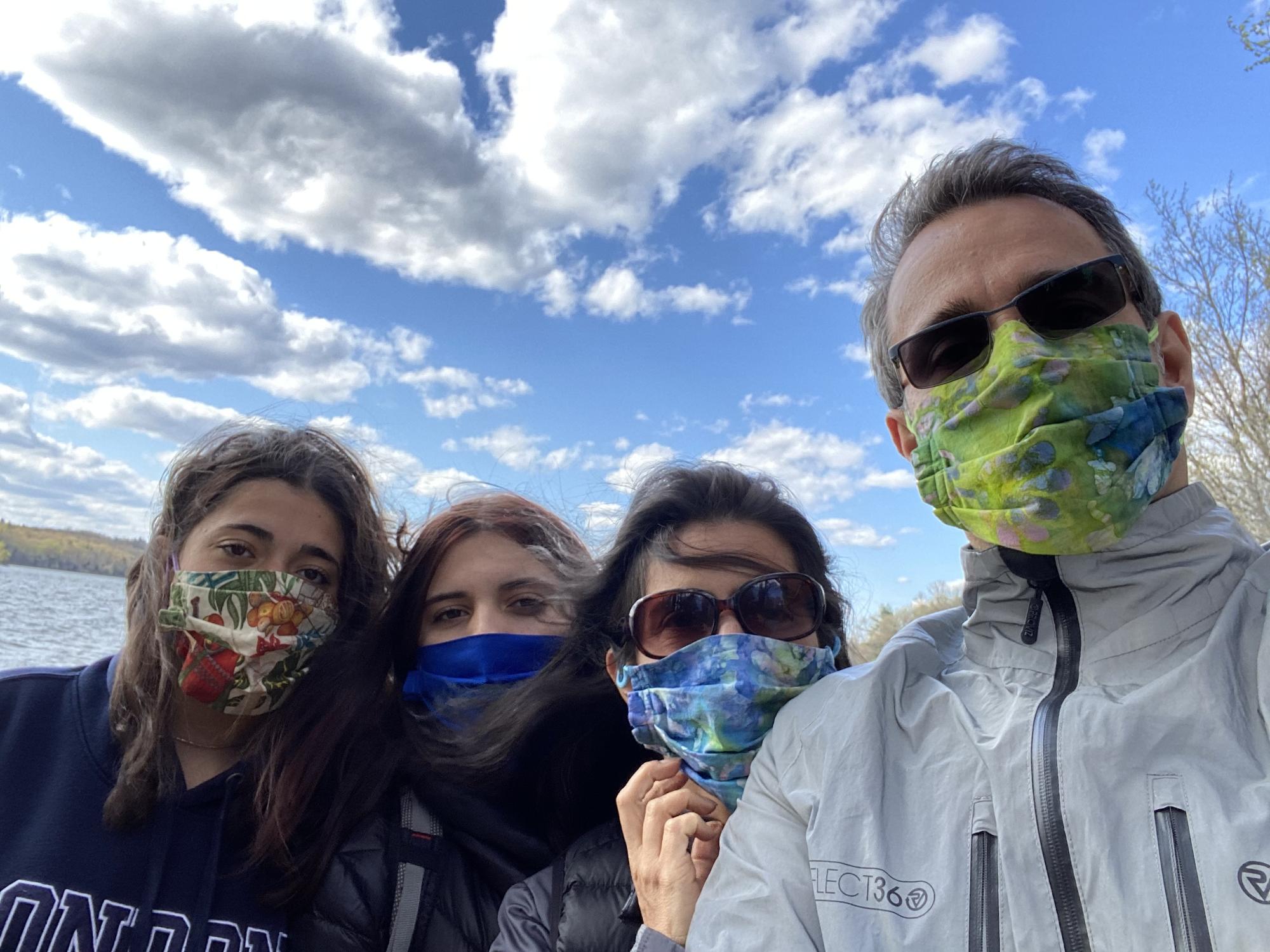
The pandemia with its lockdowns and measures to contain the virus has resulted in a very difficult situation for the Colombian economy. The country shut down early, many say, but there was no clear information about the panorama. In the face of the projected necessities of medical infrastructure, the lockdown had two objectives: to contain the spread of the virus and to prepare hospital infrastructure. A difficult decision because it drastically affected the economy and a great part of the population. Even if the pandemic disappeared, the recuperation of the economy will be a very slow process because of the still-existing dependence on basic products and on sectors such as tourism and remittances from abroad have dropped dramatically. All this will leave a legacy of social deterioration.
Perhaps the most worrisome thing in Colombia and in Latin America as a whole is that we are already a region marked by profound inequality—and the pandemia has made this even more evident. For some, to stay at home means the discomfort of not being able to go out for habitual activities, but with the possibility of online cooking and exercise classes. For others, the majority of the population, to stay at home is to condemn oneself and one’s family to hunger or to live in a hell due to overcrowding or in conditions of domestic violence.
Informal work has made the decision to stay at home impossible, and has provided evidence that an enormous portion to the population lives outside a system that has not known how to incorporate them, a system that keeps them from integrating and whose only form of survival in this pandemic is government subsidies or community charity. It is painful and frustrating to see the images on Internet and Twitter, in which red rags are hung out like flags as signs of hunger, while local and national governments hand out some aid.
These inequalities are even more stark between the city and the countryside, and within the cities themselves, some children can keep on with their classes from their computers at home, while some public school students find it impossible because they share a computer among several family members or simply because they don’t have access to a computer at all or they don’t have internet, manifesting a digital divide. Another of the inequalities, in addition to informal work and education, is access to health care. In rural, deep Colombia, there is no hospital infrastructure and sometimes not even a health clinic. This means that in much of Colombia’s territory, people die without having access to a hospital or a doctor; in almost half the national territory, an intensive care unit is eight to ten hours away, and in this context, several regions that have been affected by the conflict and indigenous communities where cases of coronavirus have been reported do not have any access to hospitals at all.
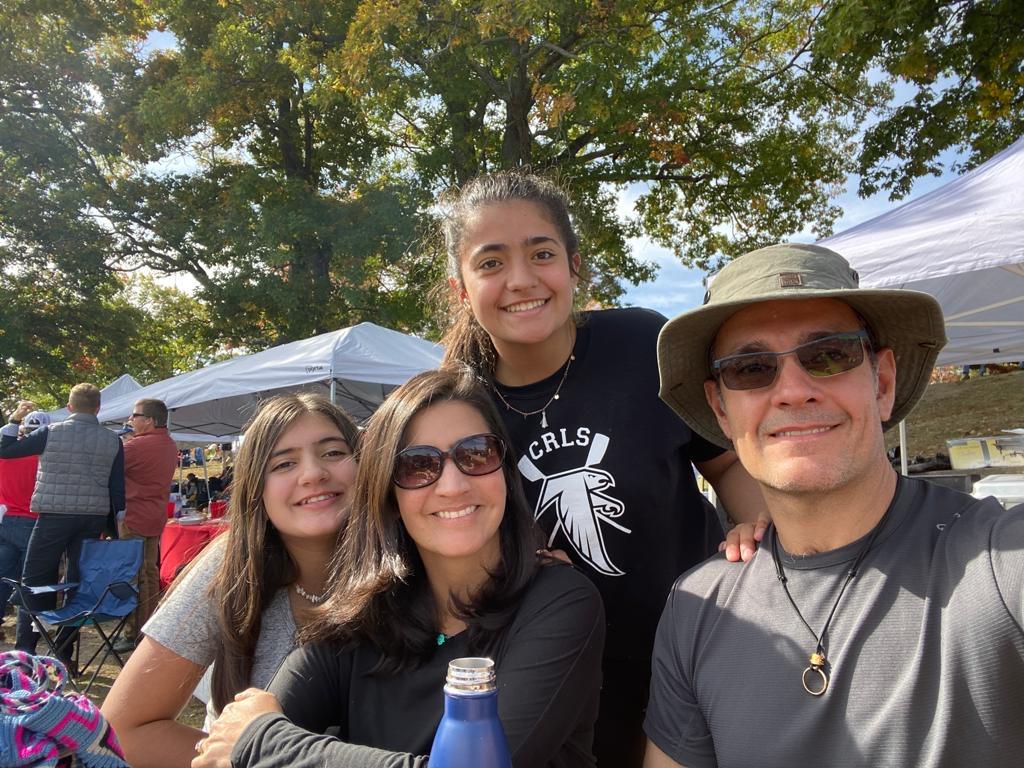
As is that’s not enough, although the quarantine creates s sense of pause, Colombia’s great problems are anything but—there are many challenges for a country in transition from conflict to a a stage of construction of peace, despite weak implementation of the peace treaty and with many difficulties. The assassination of social leaders and former combatants continues; deforestation has increased in the midst of the pandemic; foundations and experts have denounced that the burning of lands in the first four months of this year has been greater than in the entire year of 2019 and in many regions, the norms of quarantine are controlled by the armed groups.
In spite of this situation, solidarity has flourished among Colombians; all across the country, society had movilized to make donations, distribute food and subsidies to those who most need them, some initiatives coordinated by local and national governments, but the majority individual initiatives by people who have managed to collect a great quantity of resources. In the middle of all this, many businesses have reinvented themselves, exploring ways to keep their employees on the payrolls and making large donations. In the midst of all this overwhelming inequity, there is a sense that we are going to move forward as a country.
And in the midst of this situation of impotence, being so far away from home in the pandemic, we have had a warm reception and solidarity that have made us feel at home. Our little community of neighbors, friends and fellow Harvard Fellows have adopted us and cared for us as members of their community—in addition to all the calls and messages from friends and family at a distance. We have received flowers, soups, greetings, books, calls and messages. Across the garden fence, we have performed with neighbors an exchange of wines for desserts, clay and tools to work on ceramics in a distance class, newspapers and magazines with information from Latin America and Colombia, reading them beforehand to be able to discuss what’s going on in our country and how the pandemic is being experienced in that part of the world.
Thus, with all this back and forth, with the impotence of being far from home and with the anxieties that surround us, I keep on thinking that this year gave us the possibility of happiness, living each and every day intensively because we knew it would end, seeking silence, looking inward, valuing like never before our conversations and time with the family, in spite of the great uncertainty because we do not know when we can go back to Colombia and how our lives will change. We have learned to have very long conversations, listening and being listened to, wagering that this pandemic will leave us lessons as individuals and as a society to inhabit this planet in a different way. I have the conviction that much more cooperation and real compassion in these moments can generate the changes that the world needs.
Pandemia lejos de casa
Por Juana García Duque
Venir a Harvard al David Rockefeller Center for Latin American Studies (DRCLAS) como Santo Domingo Visiting Scholar ha sido una de las mejores experiencias que he vivido. Es estar en un ambiente absolutamente retador e inspirador, donde siempre estás aprendiendo y sobre todo cuestionando tus propios pensamientos y conocimientos.
Llegué de Colombia, donde trabajo como profesora asociadada de la Facultad de Administración de la Universidad de los Andes en Bogotá, a Cambridge con mi familia en lo que sería un año sabático ideal: yo dedicada a mi investigación, mis hijas Alicia de 14 entró en el primer año (freshman) al único high school y Ema de 12 a uno de los middle school y Fernando, mi esposo, comenzaría una nueva exploración profesional.
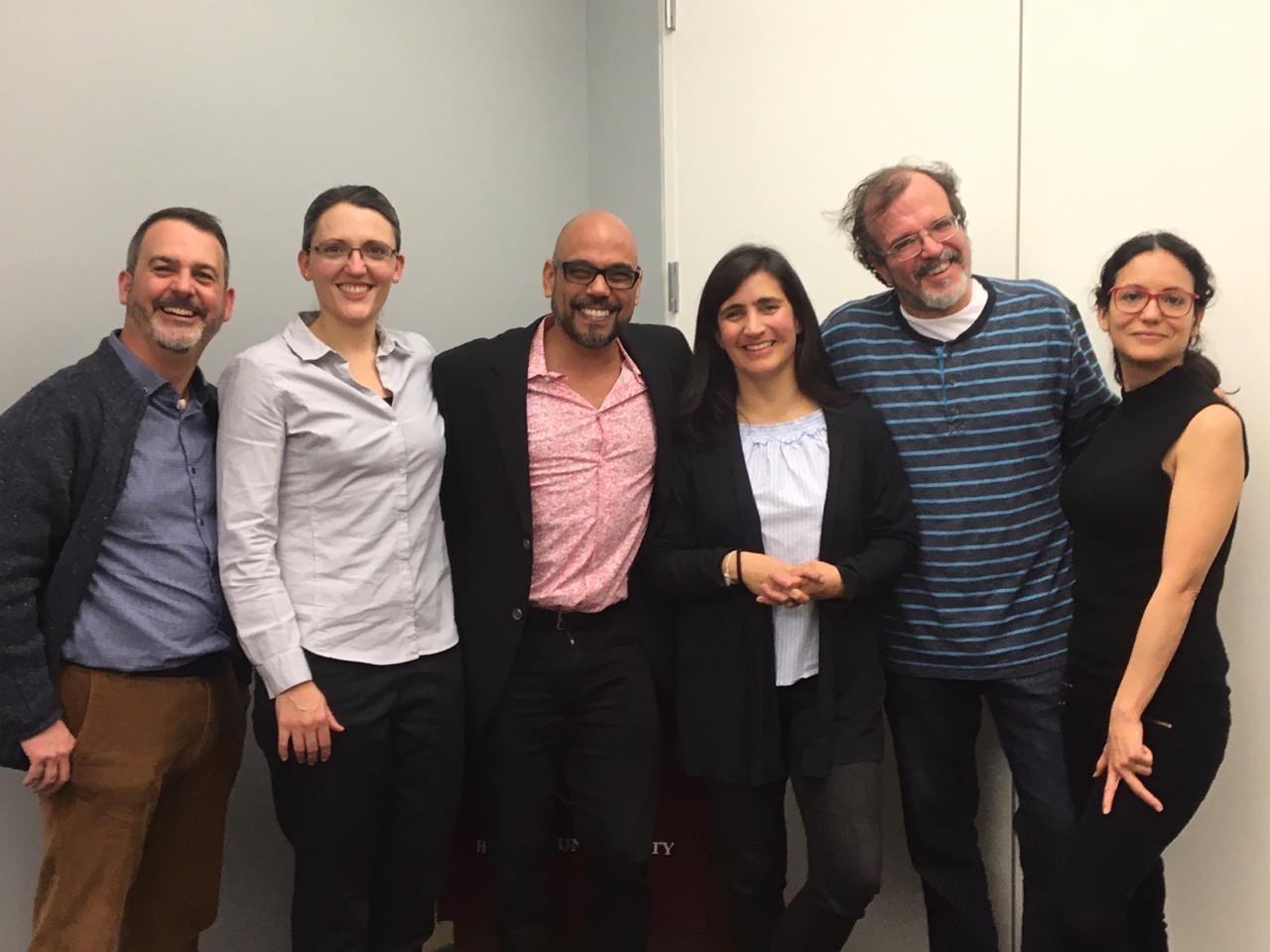
Ellas rápidamente se adaptaron a sus colegios, hicieron grandes amigos y se convirtieron casi en hablantes nativas de inglés. Alicia entró al equipo de remo entrenando muy fuerte, tuvo sus competencias de otoño y entrenó duro en invierno para mejorar y tener un mejor desempeño como equipo en la temporada de 2020. Ema por su lado ha tenido unas actividades extracurriculares increíbles, retos de innovación trabajando a la par con empresas como Bose y el centro de innovación del Hospital Pediatrico de Boston, ser parte de un club de ciencias para niñas y variedad de clases en MIT. Ser adolescente en una ciudad como Cambridge es un privilegio, pues tienes una oferta de actividades inimaginables en deportes, clases en Harvard y MIT, challenges de innovación y emprendimiento, y sobre todo tienes la seguridad para moverse solas desde muy joven, una autonomía e indepencia que no tenían mis hijas viviendo en Bogotá.
Fernando, quien al principio pensábamos dedicaría más tiempo a viajar a Colombia por los proyectos con su empresa, logró coordinar gran parte de su trabajo desde casa y al recibir su permiso de trabajo; ya tenía proyectos acá. El poder estar cerca de la familia que vive en las afueras de Boston y en Estados Unidos también era parte de esta gran aventura.
Para mí el día transcurría entre la casa y la oficina, espacio que compartí con un equipo maravilloso de colegas y con los otros Visiting Scholars de DRCLAS con quienes aprendí muchisimo. Recorriendo a diario un campus magnífico y enorme, teniendo la posibilidad de asistir a clases, conferencias, seminarios, contactar con otros investigadores y profesores, conferencistas, personas muy interesantes de las más variadas disciplinas, ir de paso por la biblioteca a recoger algún libro o trabajar en una de las salas inspiradoras que tienen varias de ellas, ir a alguno de los gimnasios o espacios deportivos, visitar el lago, el río, ir a algún concierto, pasar por alguna de las salas de los museos de Harvard, que quedan a un par de cuadras de la oficina, recorrer la arquitectura de Harvard y MIT y descubriendo a diario maravillosos rincones a lo largo de Cambridge. Todo esto a pie o en bicicleta, lo que daba cuenta de un ritmo más pausado, con mucho trabajo y proyectos por desarrollar pero sin la presión de una fecha de entrega cercana y con un ambiente tan inspirador que animaba a crear y escribir. Este tiempo en Harvard ha sido un tiempo de aprender a disfrutar el proceso más que llegar a un resultado particular, es haberme dado la oportunidad de aprender, desaprender, de romper paradigmas y de recibir.
En medio de este contexto, empezamos a oír noticias sobre el virus que estaba en China, noticias que parecían muy lejanas y de las que no pensábamos podían afectar nuestra rutina maravillosa. A inicios de marzo, Harvard envió un correo electrónico a sus estudiantes, pidiendo no viajar para el descanso de la primavera que coincidía con la tercera semana del mes. Unos días después, la universidad envió un correo adicional pidiendo a todos que se fueran y no volvieran y que por ahora no volviéramos a las oficina. Fueron días muy extraños, pues no obstante aún funcionaban bibliotecas y museos con el ID de Harvard, el acceso al público estaba cerrado. Tuvimos la posibilidad de estar solos en el Peabody Museum lo cual fue un regalo, pero a la vez se sentía el miedo de que algo más grave de lo que imaginábamos estaba por venir; al mismo tiempo que esto pasaba iban cerrando las bibliotecas y muchos de los cafés y restaurantes.
Los días siguientes se vivió un ambiente muy extraño en toda la universidad, celebraciones en medio de alegría y tristeza, despedidas y fiestas anticipadas mientras veíamos abrazos, maletas y cómo se iba desocupando poco a poco el campus. De manera paralela fuimos viendo por televisión y en la prensa cómo cada uno de los países y los aeropuertos de América Latina iban cerrando fronteras y operaciones respectivamente. En ese momento estando los cuatro, decidimos quedarnos y pasar la tormenta: tomar un avión en esos momentos nos ponía en riesgo a todos, sin si quiera imaginar que la tormenta sería más larga de lo imaginado.
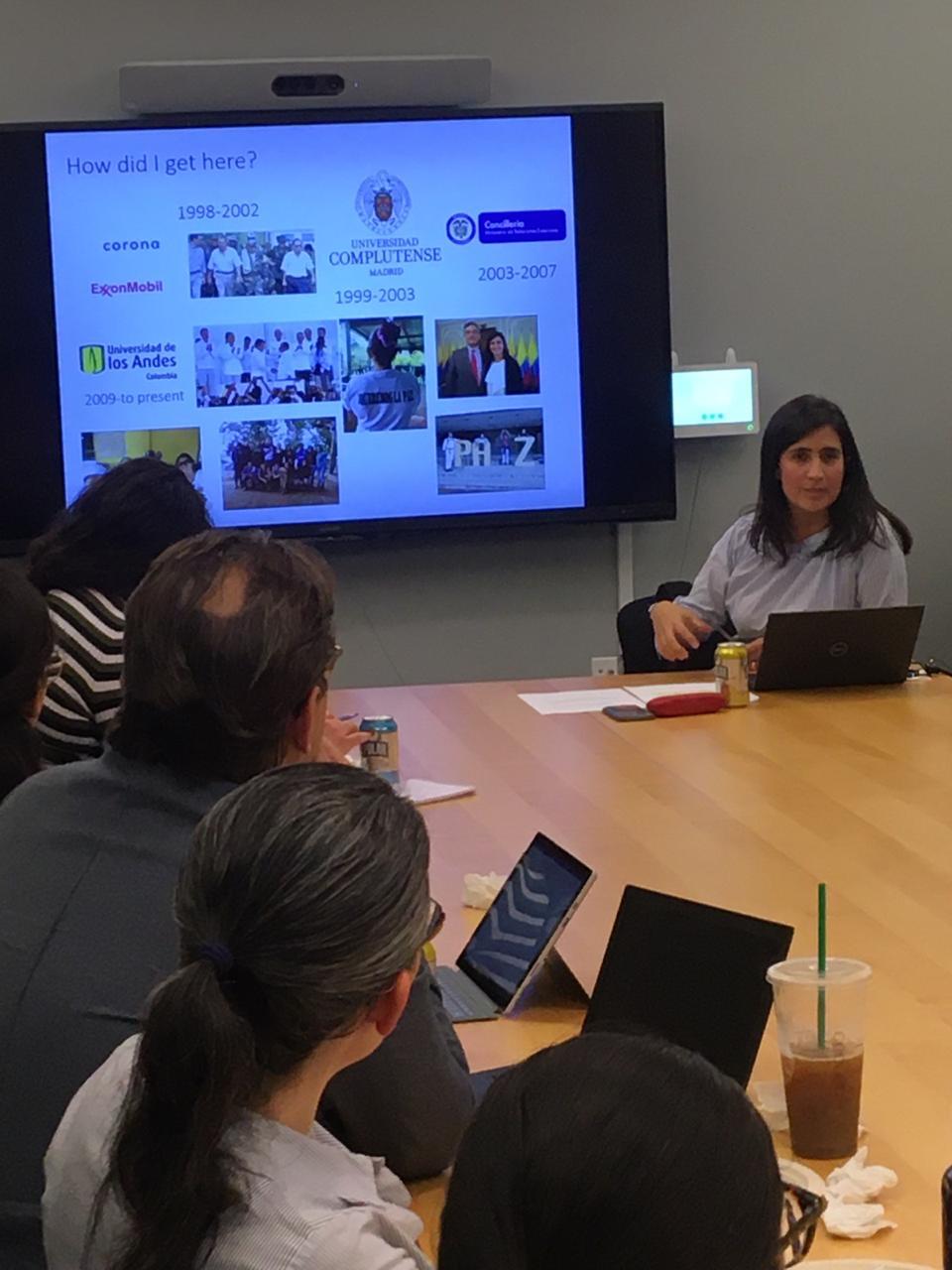
A partir de ese momento, la rutina y la vida cambiaron, claramente no solo para nosotros, sino el mundo entero. “Stay home,” “social distance” y ahora las mascarillas se convirtieron en nuestra nueva normalidad, mientras nos acostumbramos a estar más tiempo en casa con el trabajo, el colegio en línea, las actividades del hogar, viviendo una cotidianidad nueva en la que aprender a dialogar, a oír y a construir un nuevo relacionamiento se ha vuelto esencial y en especial con las niñas para quienes al igual que muchos adolescentes, esta es una situación frustrante.
En el inicio de la pandemia, mis días transcurrían siguiendo las noticias y el incremento de casos en el mundo entero, intentando analizar y lanzando hipótesis, hasta que un día de tanto agobio e impotencia decidí dejar de tratar de enterarme de todo y analizar lo que ocurría en el mundo y comenzar seguir algunas pocas noticias y los casos de los Estados Unidos, especialmente los de Massachussetts y de Colombia.
El estado de Massachussetts y la ciudad de Bogotá tienen una población similar (alrededor de siete millones de personas), pero las condiciones con que cuenta cada uno para enfrentar la pandemia son muy distintas. Vivimos en Cambridge, en las afueras de Boston, donde hay densidad poblacional cinco veces menor que la de Bogotá. Massachussetts es uno de los estados con mejor infraestructura hospitalaria del país. Mientras que en Bogotá, a pesar de contar con buena estructura hospitalaria, en las zonas más pobladas y más pobres hay menos disponibilidad de recursos hospitalarios. Otro factor que afecta de una manera importante es que en Bogotá al igual que en el resto del país, la consecución de material hospitalario ha sido difícil frente a la competencia, en su mayoría desleal, debido a los juegos de presión de poder que están ejerciendo los países, principalmente del primer mundo, a nivel internacional.
Hemos estado bien, en medio de estar lejos de casa, la rutina diaria se hace llevadera en Cambridge porque las restricciones son menores que la cuarentena en Colombia. Aunque están solamente abiertos supermercados, farmacias y restaurantes para domicilios, se nos permite salir a hacer ejercicio, caminar un poco, aprovechar a respirar, recorrer alguno de los lagos o el río y disfrutar la primavera en todo su esplendor. A pesar de eso, tengo sentimientos de tristeza e impotencia por lo que pasa en Colombia y América Latina.
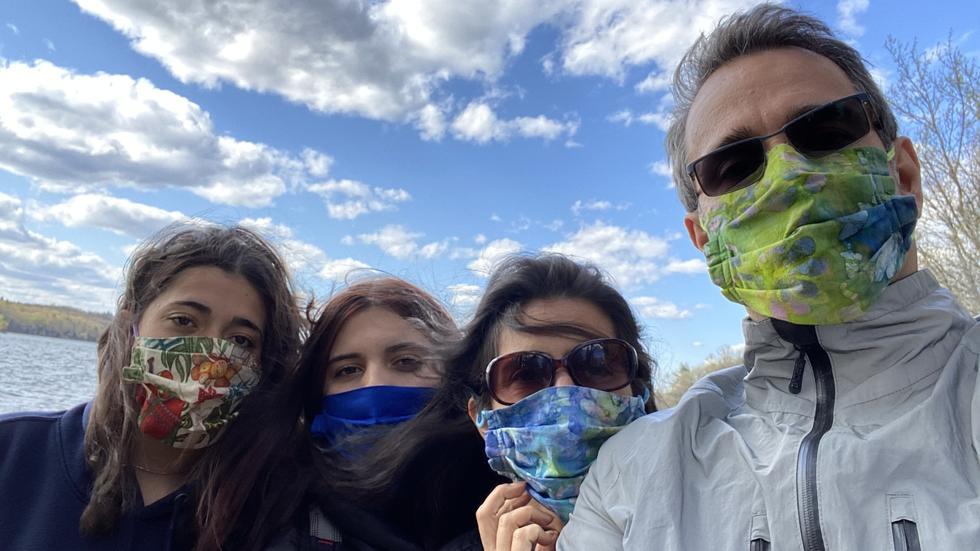
La pandemia con los encierros y medidas para contener el contagio ha generado una situación muy difícil para la economía de Colombia. El país cerró, según muchos, antes de tiempo, pero no había la información clara del panorama y ante las necesidades proyectadas de infraestructura médica se decretó el encierro con dos objetivos: contener el contagio y preparar la infraestructura hospitalaria. Decisión difícil porque afectó de manera drástica la economía y a gran parte de la población. Aún si la pandemia desapareciera, la recuperación de la economía será un proceso muy lento debido a la dependencia aún de productos básicos y de sectores como el turismo y las remesas que han caído dramáticamente y por el deterioro social que dejará.
Tal vez lo más preocupante en Colombia y toda la región, es que ya éramos una región marcada por la profunda desigualdad y la pandemia la ha hecho más evidente. Quedarse en casa para algunos significa la incomodidad de no salir a actividades habituales pero con la posibilidad de clases virtuales de cocina y gimnasia, pero para una gran parte de la población, quedarse en casa es condenarse al hambre o vivir un infierno tanto por hacinamiento como por las condiciones de violencia dentro del propio hogar.
La informalidad ha hecho que la decisión de quedarse en casa sea imposible y ha evidenciado el hecho que una porción enorme de la población vive fuera de un sistema que no ha sabido cómo incluirlos, que los mantiene fuera y cuya única fuente de supervivencia en esta pandemia son los subsidios del gobierno y/o la caridad de la comunidad. Ver las noticias a través de Internet y Twitter, en las que muestran trapos rojos a manera de bandera en las puertas de las casas de varios barrios de Bogotá y el país en señal de hambre, mientras el gobierno local y nacional repartía ayudas, fue doloroso, fue frustrante.
Estas desigualdades se evidencian aún más entre la ciudad y el campo, y en las mismas ciudades entre los niños que pueden seguir las clases virtuales desde sus computadores de casa, y los niños de colegios públicos que no todos han podido seguir las clases porque deben compartir un computador entre varios miembros de la familia o simplemente porque no lo tienen o no tienen acceso a internet, evidenciando una brecha más, la digital. Otra de las desigualdades además de la informalidad y la educación, es el acceso a salud, en la Colombia rural y profunda no hay infraestructura hospitalaria y ni siquera un puesto de salud, eso hace que en gran parte del territorio la gente muera sin poder tener acceso a un hospital o un médico; en casi la mitad del territorio nacional la distancia (en horas) a una unidad de cuidados intensivos es de ocho a diez horas y en este contexto varias regiones que han sido afectadas por el conflicto y comunidades indígenas donde ya se han reportado casos no tienen acceso hospitalario.
Como si fuera poco, aunque el encierro genere una sensación de pausa, los grandes problemas en Colombia no lo están, son muchos frentes para un país en transición de un conflicto a una etapa de construcción de paz, con una aún débil implementación de lo acordado y con muchas dificultades. El asesinato de líderes sociales y excombatientes continúa, la deforestación se ha incrementado en medio de la pandemia, fundaciones y expertos denuncian que la quema de tierras durante los primeros cuatro meses de este año podría ser superior a la de todo 2019 y en muchas regiones las normas de cuarentena las están controlando los grupos armados.
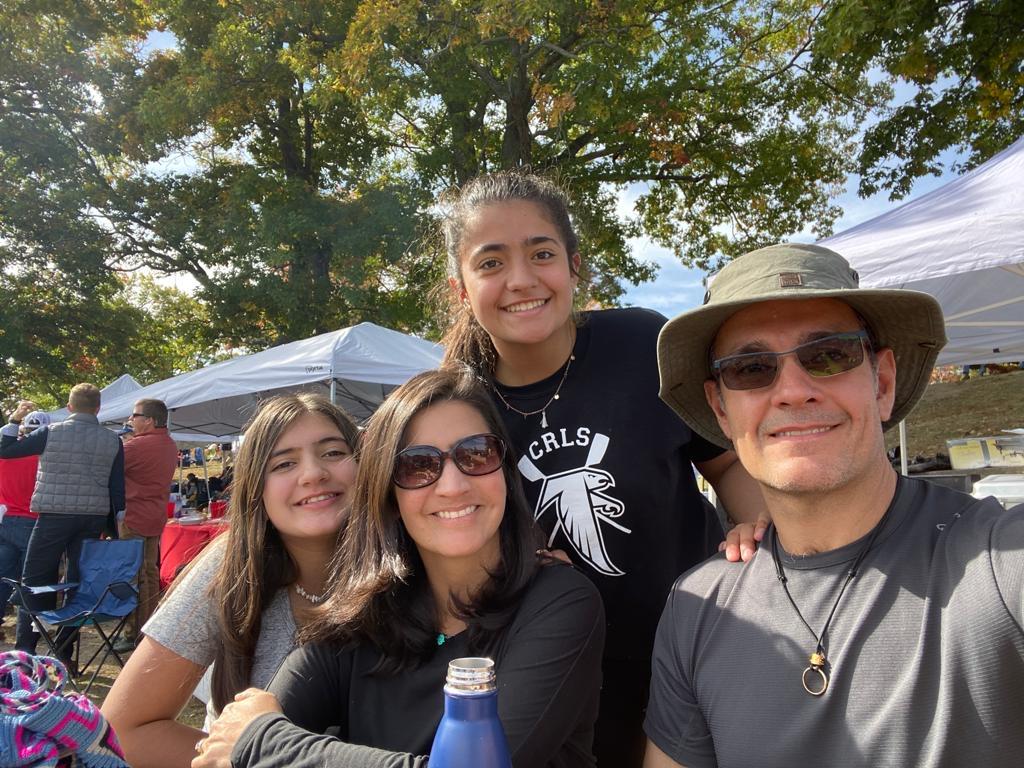
A pesar de esta situación, la solidaridad ha aflorado en los colombianos, a lo largo y ancho del país se ha movilizado la sociedad para hacer donaciones, repartir mercados y subsidios a quienes más lo necesitan, algunas iniciativas coordinadas por gobiernos locales y nacional, pero la mayoría iniciativas individuales de personas que han logrado movilizar gran cantidad de recursos. En medio de esto, muchas empresas se han reinventado, han explorado figuras para mantener los empleos y han hecho grandes donaciones. Hay un sentimiento en medio de esta abrumante inequidad, que hoy todos ponemos para sacar el país adelante.
Y en medio de esta situación de impotencia de estar lejos de casa en la pandemia, hemos tenido una acogida y una solidaridad que nos ha hecho sentir como en casa. Nuestra pequeña comunidad de vecinos, amigos y los demás fellows de Harvard nos han adoptado y cuidado como unos miembros más de su comunidad, además de las llamadas de familia y amigos desde la distancia. Hemos recibido flores, sopas, saludos, libros, llamadas y mensajes, intercambio de vinos por postre, arcilla e implementos para trabajar cerámica con clase remota a través del jardín, revistas y periódicos con información de América Latina y Colombia previa lectura de ellos para discutir sobre lo que pasa en nuestro país y cómo se vive la pandemia en esa región del mundo.
Así es que con todos los ires y venires, con la impotencia de estar lejos de casa y con las angustias que nos rodean, sigo pensando que este año nos dio la posibilidad de ser muy felices, viviendo con intensidad cada día porque sabíamos que terminaría y hoy en esta coyuntura, continuamos viviendo con la misma intensidad, un día a la vez, buscando silencio, mirando hacia adentro, valorando como nunca las conversaciones y tiempo en familia, a pesar de esta gran incertidumbre en la que no sabemos cuándo podremos regresar, y cómo cambiarán nuestras vidas. Largas conversaciones que hemos aprendido a tener oyendo y oyéndonos, apostando para que esta pandemia nos deje las lecciones individuales y como sociedad para habitar este planeta de manera distinta y con la convicción que hay mucha más cooperación y compasión real en estos momentos para generar los cambios que este mundo necesita.
Related Articles
A Review of Cuban Privilege: the Making of Immigrant Inequality in America by Susan Eckstein
If anyone had any doubts that Cubans were treated exceptionally well by the United States immigration and welfare authorities, relative to other immigrant groups and even relative to …
A Review of Conservative Party-Building in Latin America: Authoritarian Inheritance and Counterrevolutionary Struggle
James Loxton’s Conservative Party-Building in Latin America: Authoritarian Inheritance and Counterrevolutionary Struggle makes very important, original contributions to the study of…
Endnote – Eyes on COVID-19
Endnote A Continuing SagaIt’s not over yet. Covid (we’ll drop the -19 going forward) is still causing deaths and serious illness in Latin America and the Caribbean, as elsewhere. One out of every four Covid deaths in the world has taken place in Latin America,...

